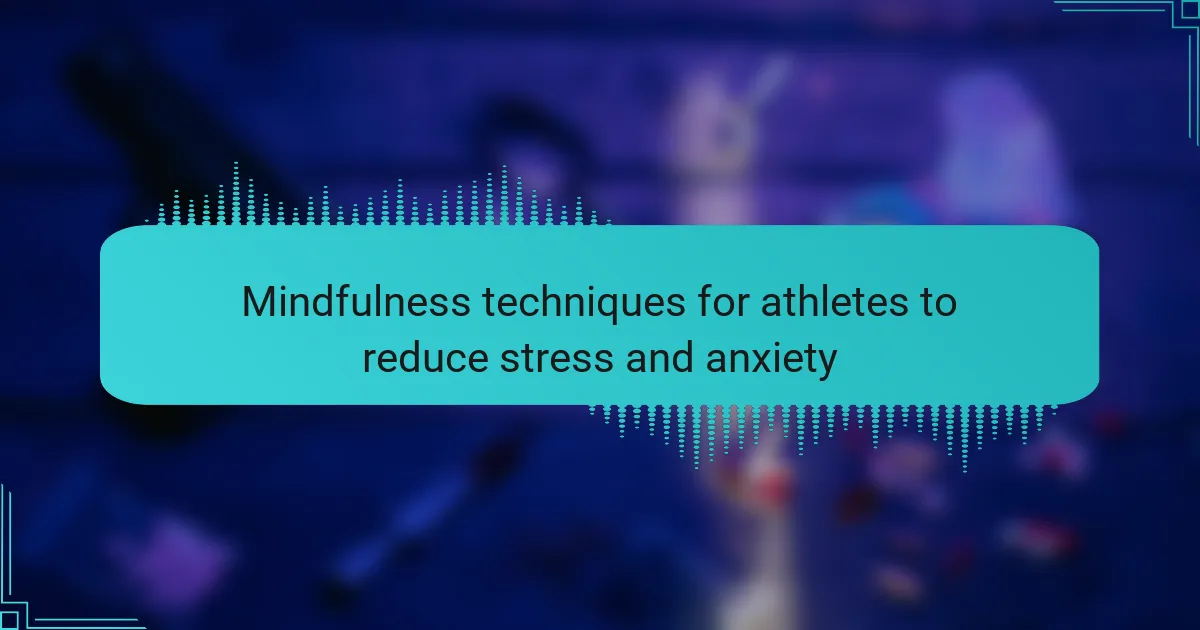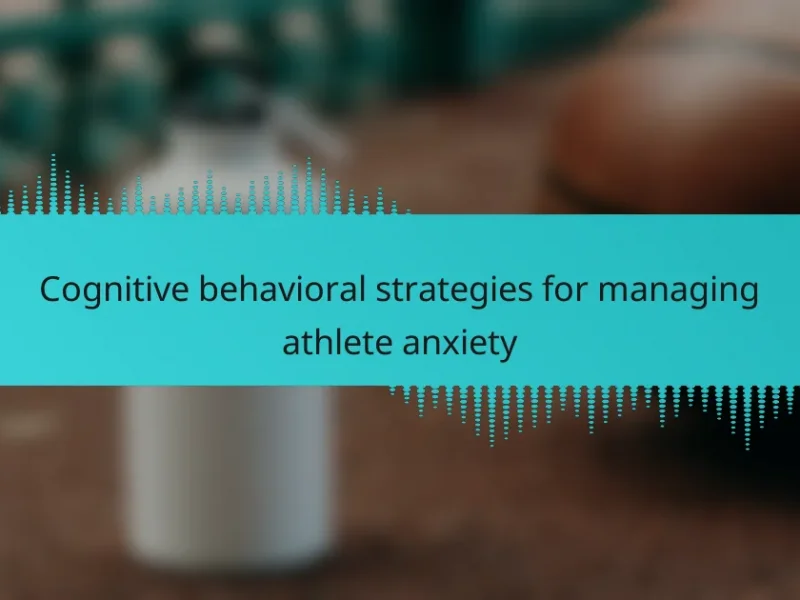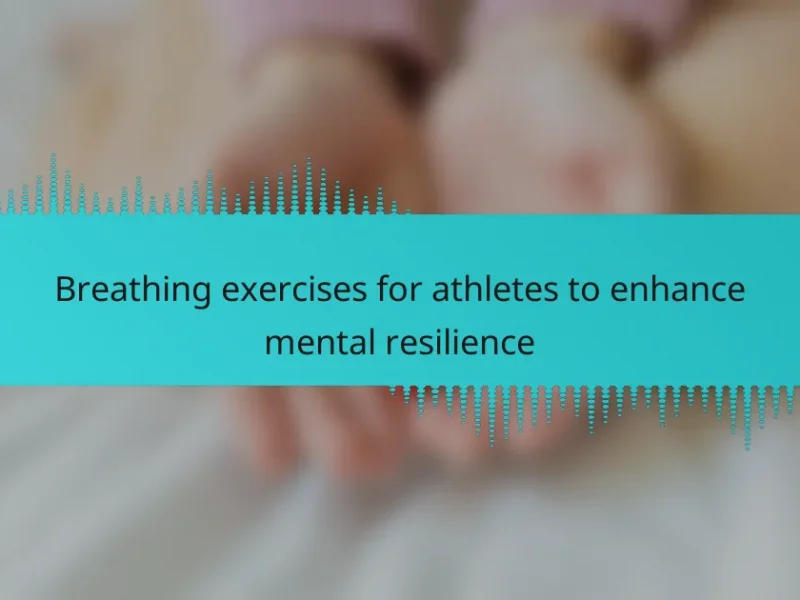Athletes often face stress and anxiety that can hinder performance. Mindfulness techniques like deep breathing, visualization, and body scanning can effectively reduce these feelings. These practices enhance focus, boost confidence, and promote relaxation. Tailoring these techniques to individual needs fosters resilience in high-pressure situations.
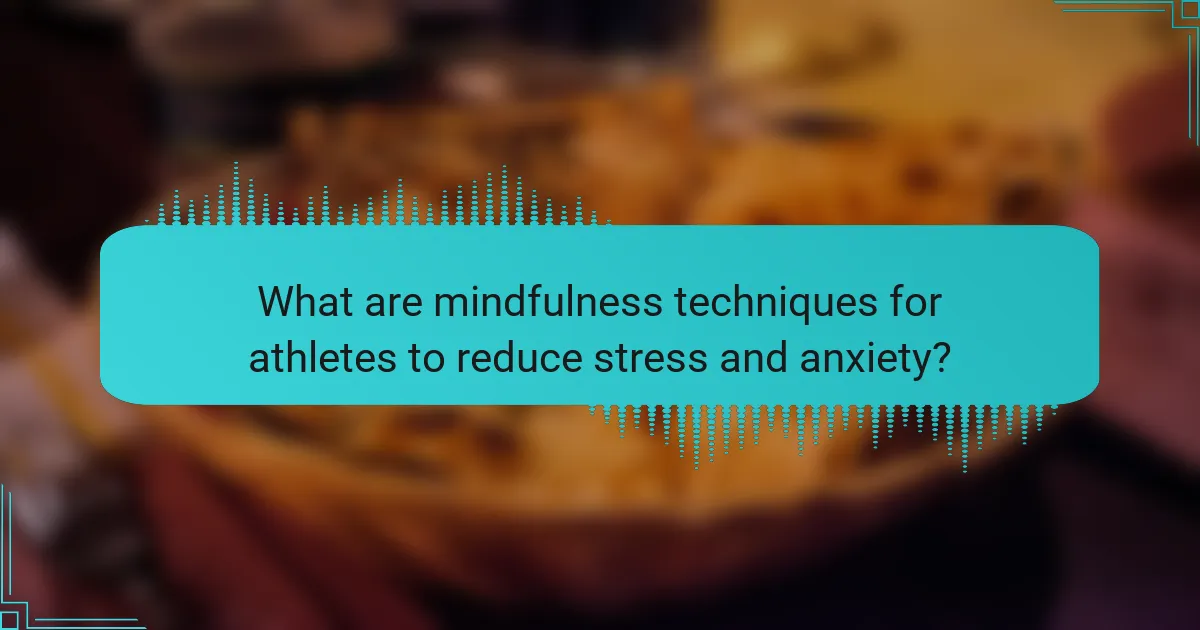
What are mindfulness techniques for athletes to reduce stress and anxiety?
Mindfulness techniques for athletes include deep breathing, visualization, and body scanning to effectively reduce stress and anxiety. Deep breathing helps regulate the nervous system, enhancing focus and calmness. Visualization allows athletes to mentally rehearse performances, boosting confidence and reducing anxiety. Body scanning promotes awareness of physical sensations, aiding in relaxation and stress management. Each technique fosters a positive mental state, essential for optimal performance.
How do mindfulness techniques impact athletic performance?
Mindfulness techniques significantly enhance athletic performance by reducing stress and anxiety. These practices improve focus, increase resilience, and foster a positive mindset, all crucial for peak performance. Studies show that athletes who incorporate mindfulness report lower levels of anxiety and better emotional regulation. For example, a survey found that 75% of athletes using mindfulness techniques experienced enhanced concentration during competitions.
What is the science behind mindfulness and stress reduction?
Mindfulness techniques significantly reduce stress and anxiety in athletes by promoting focus and relaxation. These practices, such as deep breathing and body scanning, enhance mental clarity, allowing athletes to manage pressure effectively. Research shows that regular mindfulness training can lower cortisol levels, improving overall performance. Additionally, visualization techniques help athletes mentally rehearse, reducing pre-competition anxiety. Integrating mindfulness into training routines fosters resilience, enabling athletes to perform at their best even under stress.

What are the universal attributes of mindfulness techniques?
Mindfulness techniques for athletes universally promote mental clarity, emotional regulation, and stress reduction. These techniques often include breathing exercises, body scans, and focused attention practices. They enhance performance by fostering resilience and improving concentration. Additionally, they can be tailored to individual needs, making them accessible to various athletic disciplines.
How can breathing exercises help athletes manage anxiety?
Breathing exercises can significantly help athletes manage anxiety by promoting relaxation and focus. These techniques enhance oxygen flow, reduce heart rate, and stabilize emotions. Athletes who practice mindful breathing report improved performance under pressure. Research indicates that regular breathing exercises can lower cortisol levels, a hormone linked to stress. Incorporating these exercises into training routines fosters resilience, enabling athletes to maintain composure during competitions.
What role does visualization play in mindfulness for athletes?
Visualization plays a crucial role in mindfulness for athletes by enhancing focus and reducing anxiety. This technique allows athletes to mentally rehearse their performance, creating a sense of familiarity and confidence. Research indicates that visualization can improve outcomes by activating neural pathways similar to actual practice. Additionally, it aids in stress reduction by promoting relaxation and clarity. Athletes who regularly incorporate visualization report increased mental resilience and improved overall performance.
How does body awareness contribute to stress reduction?
Body awareness significantly contributes to stress reduction by enhancing mindfulness in athletes. It fosters a deeper connection between the mind and body, promoting relaxation and focus. Techniques such as breath awareness and body scanning help athletes identify tension and stress points, facilitating immediate relief. Research indicates that athletes practicing body awareness report lower anxiety levels and improved performance metrics. This unique attribute of body awareness not only aids in stress management but also enhances overall athletic well-being.

What unique mindfulness techniques can athletes use?
Athletes can use unique mindfulness techniques such as visualization, body scanning, and mindful breathing to reduce stress and anxiety. Visualization involves imagining successful performances, enhancing focus and confidence. Body scanning helps athletes connect with their physical sensations, promoting relaxation. Mindful breathing encourages awareness of breath patterns, aiding in emotional regulation. These techniques can be tailored to individual needs, fostering mental resilience in high-pressure situations.
How can athletes implement mindful movement practices?
Athletes can implement mindful movement practices by integrating techniques like focused breathing, body awareness, and intentional stretching into their routines. These practices help reduce stress and anxiety, enhancing performance and overall well-being.
Focused breathing involves concentrating on each breath, promoting relaxation and clarity. Body awareness encourages athletes to tune into physical sensations, improving their connection with movements. Intentional stretching, when done mindfully, increases flexibility and reduces injury risk.
Regularly practicing these techniques can lead to improved mental resilience. As a result, athletes may experience enhanced focus during competitions and training sessions. Adopting mindful movement not only benefits athletic performance but also fosters a positive mindset.
What are the benefits of gratitude journaling for athletes?
Gratitude journaling enhances athletes’ mental resilience, boosts motivation, and reduces stress. It fosters a positive mindset, improving overall performance. Regular practice can lead to increased focus and emotional well-being by shifting attention from negative stressors to positive experiences. Studies indicate that gratitude can improve sleep quality and reduce anxiety levels, essential for optimal athletic performance.
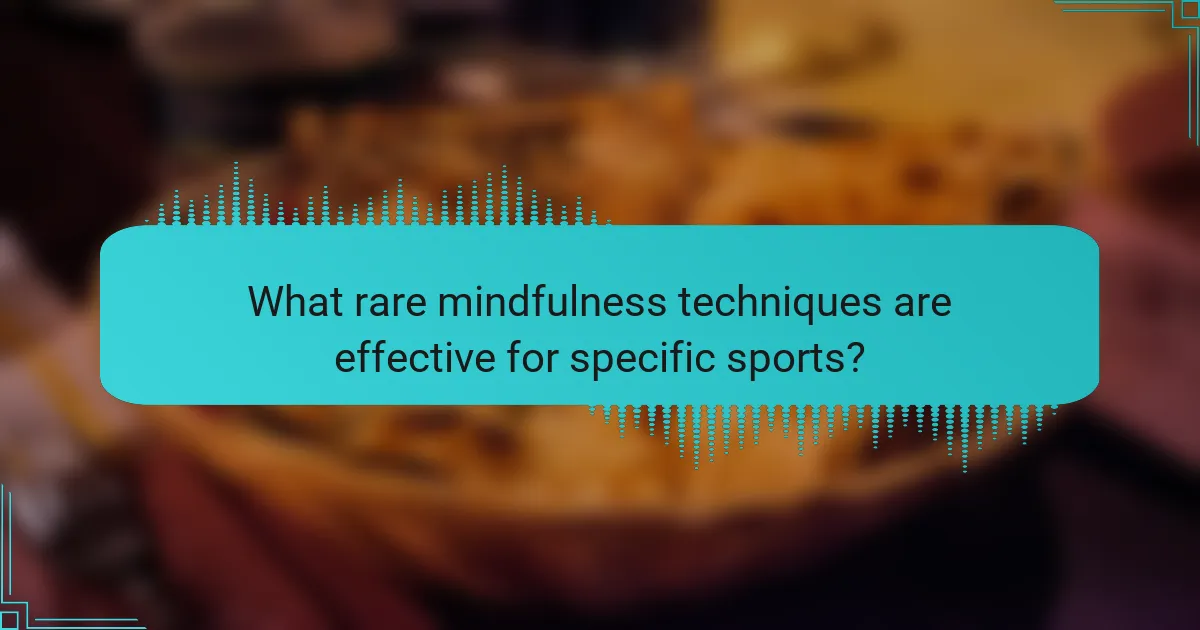
What rare mindfulness techniques are effective for specific sports?
Mindfulness techniques such as visualization, body scanning, and breath control are effective for athletes in specific sports. These rare techniques enhance focus and reduce anxiety.
For example, visualization helps swimmers mentally rehearse their strokes, improving performance. Body scanning aids runners in identifying tension, promoting relaxation. Breath control is crucial for archers, enhancing concentration during critical moments.
Incorporating these techniques can lead to improved mental resilience and overall athletic performance.
How can athletes use sound meditation to enhance focus?
Athletes can use sound meditation to enhance focus by integrating auditory stimuli into their mindfulness practices. This technique helps to clear mental clutter and improve concentration. Sound meditation can lower stress levels, allowing athletes to maintain peak performance during competitions. Research indicates that rhythmic sound patterns can synchronize brainwave activity, promoting a state of deep relaxation and heightened awareness. Regular practice can lead to improved mental clarity and resilience, essential traits for athletes facing high-pressure situations.
What are the benefits of nature immersion for stress relief?
Nature immersion significantly reduces stress and anxiety for athletes by promoting mindfulness. Exposure to natural environments lowers cortisol levels, enhances mood, and improves focus. Research indicates that spending time in nature can lead to a 20% decrease in stress. Engaging in outdoor activities fosters a unique connection to the environment, which can enhance overall well-being. Regular nature immersion practices, such as hiking or simply walking in a park, can serve as effective mindfulness techniques for athletes, facilitating mental clarity and emotional resilience.

How can athletes tailor mindfulness practices to their specific needs?
Athletes can tailor mindfulness practices by identifying their specific stressors and goals. Customizing techniques like breath control, visualization, or body scans can enhance focus and emotional regulation. Regular assessment of these practices ensures they effectively address individual needs.
What are the best practices for integrating mindfulness into training?
Practicing mindfulness in training enhances athletes’ focus and reduces stress. Techniques include breath awareness, visualization, and body scans. These methods help athletes remain present, improving performance and mental resilience. Regular integration of mindfulness sessions can lead to better emotional regulation and reduced anxiety levels.
What common mistakes should athletes avoid when practicing mindfulness?
Athletes should avoid distractions, unrealistic expectations, and inconsistent practice when using mindfulness techniques. Distractions can hinder focus, while unrealistic expectations may lead to frustration. Inconsistent practice reduces effectiveness, limiting stress and anxiety reduction.
How can athletes measure the effectiveness of their mindfulness techniques?
Athletes can measure the effectiveness of mindfulness techniques through self-assessment, performance metrics, and physiological indicators. Self-assessment involves tracking stress and anxiety levels before and after mindfulness practices. Performance metrics can include improvements in focus, reaction times, and overall athletic performance. Physiological indicators may involve monitoring heart rate variability and cortisol levels to assess stress response. Regularly reviewing these measures allows athletes to adjust their techniques for optimal results.
What expert insights can enhance mindfulness practice for athletes?
Expert insights can significantly enhance mindfulness practice for athletes by focusing on tailored techniques that address specific stressors. Techniques such as visualization can help athletes mentally rehearse performances, reducing anxiety. Incorporating breath control exercises fosters a state of calmness, enabling better focus during competitions. Additionally, engaging in body scan meditations increases self-awareness, allowing athletes to identify and manage stress responses effectively. Practicing gratitude can also shift mindset, promoting resilience and a positive outlook. These strategies, when consistently applied, can lead to improved performance and overall well-being.
